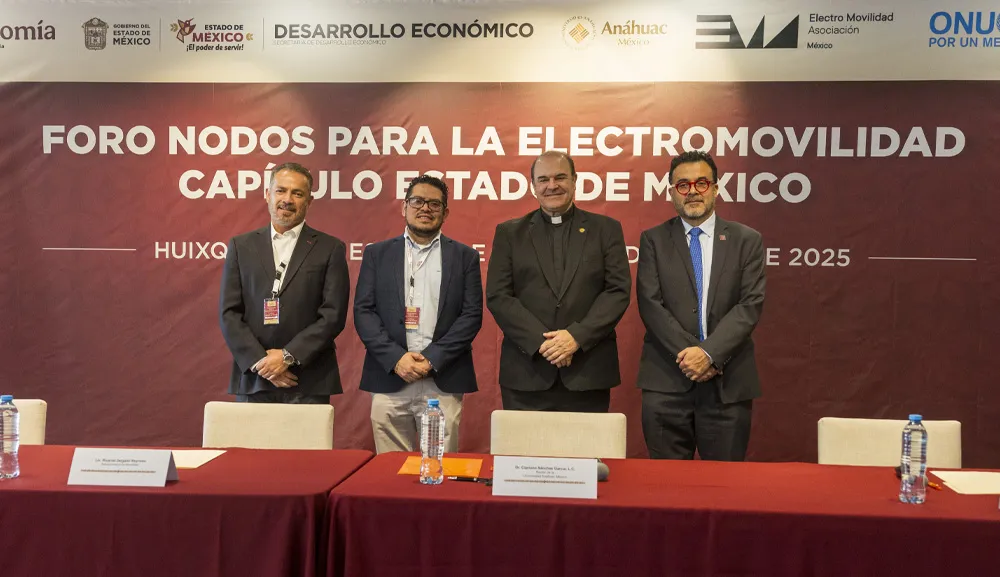The “Nodes for Electromobility: State of Mexico” Forum Brings Together Leaders at Anáhuac Mexico University

Public authorities, entrepreneurs and academics met to promote a common agenda for electric mobility, technological innovation and sustainable development in the State of Mexico.
On May 7, 2025, Anáhuac Mexico University hosted the forum “Nodes for Electromobility: State of Mexico Chapter”, a workday convened by the Ministry of Economic Development of the State of Mexico, with the participation of government agencies, automotive company executives, specialists and academics. The event promoted a multi-sector dialogue to accelerate the transition to sustainable mobility.
The forum opened with remarks by Dr. Cipriano Sánchez García, L.C., rector of Anáhuac Mexico University, who highlighted the role that higher education must play in light of the challenges facing the sector. He pointed out that universities should not only train technicians, but also leaders with critical thinking, ethics and social commitment. He stressed the importance of linking research with the needs of the country through strategic projects such as the “CLASES” program for innovation in emerging technologies. He also emphasized the need to advance technological development with an ethical and inclusive approach, paying special attention to the role of women in electromobility.
Ricardo Delgado Reynoso, Deputy Minister of Mobility of the State of Mexico, emphasized that electromobility is already a transformative reality with a positive impact on the quality of urban life. He recognized the State of Mexico as a strategic hub for its talent, infrastructure and industrial capacity, as well as the universities as key allies in this transition.
Dr. Sergio Silva Castañeda, Head of the Department of Economic Promotion and Growth of the Ministry of Economy, explained that electromobility is transforming industries, requiring constant innovation and a new way of thinking about economic development. He said that this transition requires flexible and ethical education and greater collaboration between academia, industry and government. He also emphasized the need to establish Mexico as a relevant participant in global value chains in strategic sectors.
One of the highlights of the forum was the panel on global trends in electromobility, moderated by Eugenio Grandío, President of the Electro Mobility Association (EMA) with the participation of Raymundo Cavazos, CEO of Volvo Mexico; Isidoro Massri, General Director of JAC Mexico and Edgar Suárez, Country Manager of ZEEKR Mexico. The executives agreed that electric mobility is already a reality, not an option for the future. They discussed advances in tropicalization, marketing and technical support and stressed the need to strengthen the charging network, to increase the availability of affordable vehicles and to professionalize after-sales service.
In a second panel focused on opportunities for Mexican companies, César Pedrero (Daimler Trucks Mexico) and Arturo Gómez Shuster (Supercool Mobility Center) addressed the challenges facing SMEs in terms of the energy transition. Key factors such as tax incentives, access to clean energy, recharging infrastructure and the need for clear regulations were discussed. The strategic position of the State of Mexico as a springboard for developing local suppliers and attracting investment was addressed.
During the discussions, the forum allowed for the exchange of ideas on technical, social and economic aspects. In the session dedicated to the future of electric public transport, moderated by Dr. Isabel Studer, President of Global Sustainability, specialists such as Ricardo Delgado Reynoso, Deputy Minister of Mobility for the State of Mexico, Maximiliano Zurita, Director General of CAF-Mexico; Santiago Alanís (ADO Mobility); Bernardo Baranda (ITDP), and Roberto Gottfried (Megaflux) analyzed the structural transformation that Mexico's public transport system needs and agreed that political will is essential to move towards clean, safe and inclusive models.
Another panel discussion focused on the challenges specific to the State of Mexico. Moderated by Carlos Tello, Director General of Industry of SEDECO, it included experts such as Alfonso Villa (ZF Chassis), Alberto Bustamante (ANAPROSE), Francisco Cabeza (AMIVE) and Miguel Ogazón Del Ábrego (ANPACT). The focus was on improving territorial planning based on heat and energy demand maps, and on ensuring sufficient electricity generation and distribution, especially in areas with a high concentration of population and industrial activity.
The panel on charging infrastructure was the subject of another analysis, bringing together representatives from Voltway, VEMO, EVERGO and the Ministry of Energy, who presented the challenges to expanding the charging network in the country, such as the lack of standardization of connectors, limited national coverage and the need to create clear legal conditions to attract private investment in the long term.
The development of specialized talent was a central theme of the forum. Academics from Anahuac University, the Autonomous University of the State of Mexico (UAEMéx), the National Polytechnic Institute (IPN) and the Polytechnic University of the Valley of Toluca (UPVT) participated in the discussion moderated by Hugo Isaak (UN-Habitat). They stressed that Mexico already has trained personnel, but that language learning, technical skills such as programming and mechatronics, as well as soft skills and interdisciplinary work, need to be strengthened.
The fourth panel, “Logistical Challenges in the Electromobility Supply Chain”, moderated by Lorena Isla, Vice President for Latin America at Frost & Sullivan, addressed the specific challenges faced by Mexican electric vehicle manufacturers. Rafael Garayoa (Olinia Project), Julio Jimenez (Moldex), Nazareth Black (Zacua) and Enrique Lacombe (IUSA) agreed that the variability of demand, the handling of batteries and the lack of specialized infrastructure complicate the logistics operations. They discussed solutions such as process digitization, resource sharing and collaboration between companies to improve supply chain efficiency and sustainability. They also stressed the need for public policies that facilitate planning, reduce risks and ensure operational transparency.
The conference “Electromobility Plan of the Government of Mexico” brought together representatives from the Ministry of the Economy, the Inter-American Development Bank and GIZ Mexico.
In the final panel, Monica Martinez, representative of the Ministry of Mobility of the State of Mexico, moderated a panel that presented conclusions and recommendations for building a comprehensive electromobility strategy. Participants included Rodolfo Osorio de Carrera (Ministry of Economy), Janet de Luna Jiménez (SEDATU), Eugenio Grandío (EMA), Hugo Isaak (UN Habitat) and León Hamui Balas (Anahuac University). They agreed that the State of Mexico has the ideal conditions to become a national leader in electric mobility, as long as a solid ecosystem is created with public and private participation.
The forum concluded with a message from José Antonio Gea Guinovart, Director of Institutional Development of Anáhuac Mexico University, who reaffirmed the willingness of this institution to continue promoting spaces for analysis, training and collaboration that respond to global challenges from an ethical, technical and humanistic perspective.
The day ended with a common idea: the mobility of the future is underway, and its success will depend on the coordination of the participants, the commitment to innovation, and the vision of a more sustainable, equitable and resilient country.

* Written by Crisette Romero Lugo, content editor, Institutional Communications Office
For more information:
Dr. Nora Ricalde Alarcón
nricalde@anahuac.mx
Institutional Development Department
Mexican Center for Humanism
